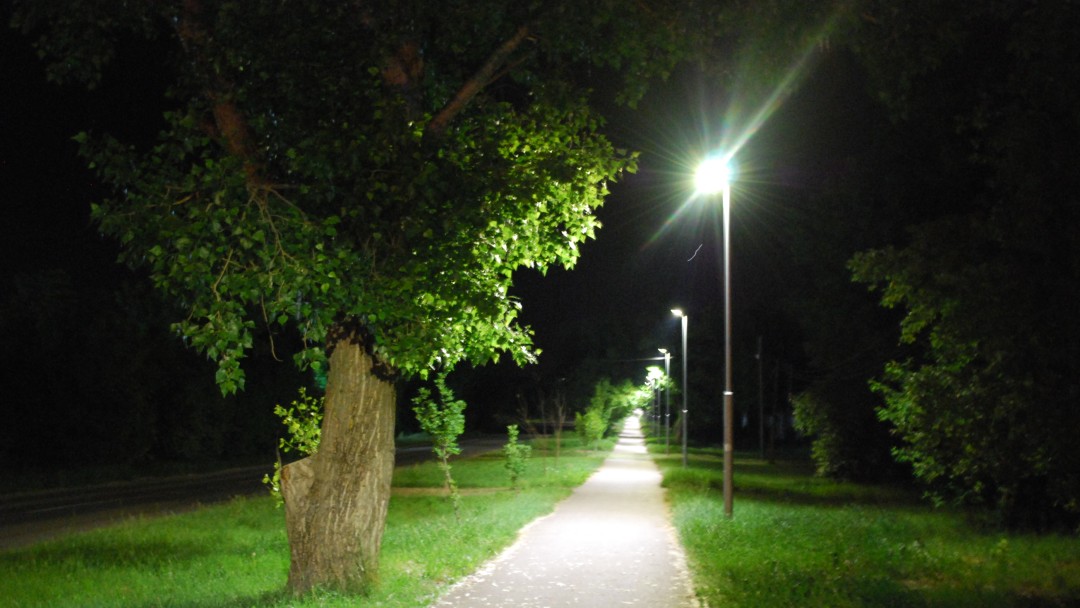

KfW is helping four Serbian cities to switch their street lighting to LED lamps. The communities of Veliko Gradiste, Stara Pazova, Kovacica and Becej are now saving half of what they previously spent on street lighting. Their greenhouse gas emissions are decreasing at the same time. The transition was funded with a low-interest loan from KfW, subsidised by the EU’s REEP Plus programme.
“Local authorities’ maintenance costs are now zero,” states Tijana Pejic, an economist at the company Special Purpose Company Public Lighting ST Belgrade. The 28 year old is responsible for the accounts and has all the figures in her head. “Each year, the new street lighting saves the two local municipalities over EUR 300,000.” In 2019, the communities of Veliko Gradiste and Stara Pazova switched to LED lamps, which come with a 13-year guarantee.
“Right now, with the coronavirus pandemic, it is important to us to be operating in a secure economic environment. That’s why we're looking to minimise risks,” explains Pejic. Changing the street lighting to LED offers several immediate advantages: LED lamps have an average service life of 100,000 operating hours or 25 years, whereas traditional lamps only last four to five years. Each LED lamp only covers a set area, helping to limit light pollution. The biggest advantage, though, is that they save energy. Local authorities in Serbia have seen energy consumption decrease by up to 75%. Naturally, this reduces the burden on the municipal budget. They also emit fewer greenhouse gases. Furthermore, LED lamps do not contain any mercury, unlike conventional lamps, making their production and disposal more environmentally friendly. Mercury-containing bulbs no longer meet EU specifications.
Local authorities also save on maintenance costs for street lighting, as the LED lamps last longer and fail less often. They are brighter, too, so citizens feel safer walking the streets at night.
In Kovacica and Becej, the street lighting was upgraded via a Public Private Partnership between the local authorities and the company Esco Elios. Erste Bank Belgrade awarded loans of up to EUR 1.9 million to the municipalities.
“Our company’s portfolio for LED street lighting is growing each year,” explains Nora Gombar, finance manager at Esco Elios. “The Public Private Partnership model is already accepted in Serbia and is becoming more widespread, so we see a lot of investment opportunities here.”
The eco-loans offered by Erste Bank and other local financial services providers with funding from KfW are supplemented by grants for final borrowers from the EU’s Regional Energy Efficiency Programme. KfW is participating in the REEP Plus programme with loans totalling EUR 50 million. Funds from the Federal Ministry for Economic Cooperation and Development (BMZ) make it possible to reduce the interest rate on the loans. The EU programme REEP Plus, which falls under the Western Balkan Investment Framework (WBIF), is supported by the European Bank for Reconstruction and Development (EBRD), the Energy Community Secretariat (EnCS), bilateral donors and KfW. It comprises four components; as well as promoting policy dialogue and interim financing, it also covers loans for the private sector and public administration. KfW is active in the last two areas.
“The measure reduces pressure on local budgets while decreasing greenhouse gas emissions – a win-win situation,” explains Dr Bianca Clausen, Head of Division at KfW Development Bank.
To date, more than 630 loans with a total value of over EUR 52.4 million have been issued to final borrowers in the region. The projects executed using this money have reduced greenhouse gas emissions by 29,000 tonnes per year.
Share page
To share the content of this page with your network, click on one of the icons below.
Note on data protection: When you share content, your personal data is transferred to the selected network.
Data protection
Alternatively, you can also copy the short link: https://www.kfw-entwicklungsbank.de/s/enzBXz4_
Copy link Link copied